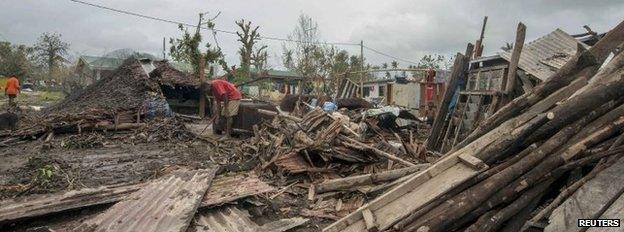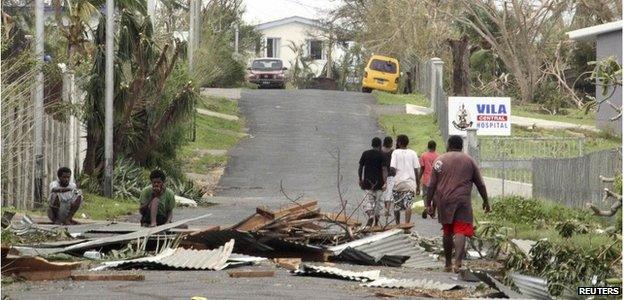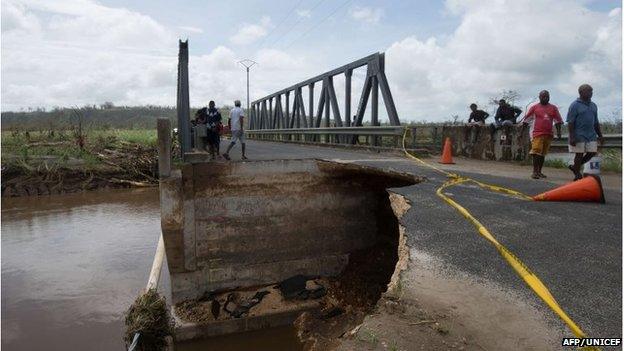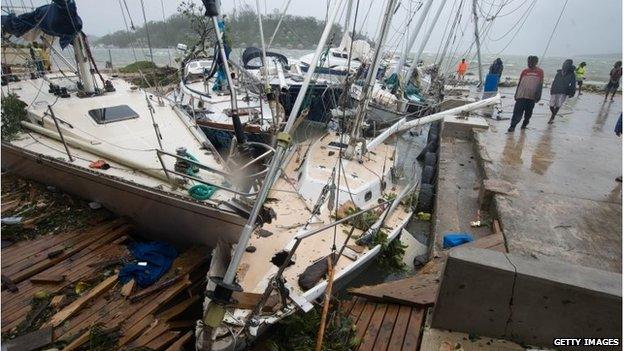Cyclone Pam: Eyewitness accounts
- Published

Vanuatu is reeling from the impact of Cyclone Pam, a maximum category five storm which ploughed through the South Pacific nation at the weekend.
Eyewitnesses have been telling the BBC about the damage in Port Vila, the capital, and other parts of the chain of 65 inhabited islands.
Hanna Butler, Red Cross communications officer, Port Vila
It's about 10.30pm now in Port Vila and the power is still out. It's very dark in the capital. There is a curfew on and people have to be indoors by 6pm. I'm in my hotel room now.
In the day, most people leave the evacuation centres to go to their homes and rebuild their lives. They usually return to the centres in the evening to sleep. From what I understand the centres are still running pretty well. Water supply has been restored to some parts of the capital although people still have to be careful in drinking it.

It's remarkable how people here have banded together to clean up the streets. Going down the road you can see that they have been piling debris pulled from the road. They have been very active and earlier in the day you could hear the sound of people using chainsaws to cut up fallen trees.
The Red Cross is currently here to do assessments across the country on the extent of the damage and what's needed. It's been challenging especially since communication lines are down. It's already been a few days since the cyclone hit and we're only beginning to see the full extent.
We are still waiting to hear from the other islands, we are lacking those reports. People have been describing to us that the island of Tanna has been flattened, and we are hoping to get there as soon as possible. Even in peacetime, many of the islands are isolated and it is hard to get from island to island.
Alice Clements, Unicef Pacificcommunications officer, Port Vila
The vast majority here have no power or shelter. All of the power lines have come down.
We've been clearing roads leading to the eastern part of the island, which is one of the worst affected areas. But then we hit this colossal bridge, which is the only one leading to that area, and it looks like a huge bite was taken out of it. This isn't just some rickety bridge, it's made of concrete and steel, and now there's just steel girders sticking out. It really shows the sheer force of the storm.

There is only one hospital for the capital and it serves the main part of the island as well. We've been delivering supplies and supporting the hospital with tents for additional patients. But many staff are still stuck at home and encountering huge difficulties in getting to the hospital.
We met a woman who is nine months pregnant and overdue. There is the question of adequate care for mothers and their babies - new mothers, when put in a stressful situation like this, will have difficulty producing breast milk to feed their newborns.
Usually after a natural disaster you would get a flood of casualties entering the hospital. But that's not what we're seeing here, it's still quite quiet. So there's a glimmer of hope. But it also may mean that people can't get to us. There is no airlifting because the more remote islands don't have airstrips. People usually get to the main island by boat.
Pilots who have been making aerial sweeps are saying that it's been an absolute catastrophe on other remote islands. Some communities have been flattened as a lot of homes were made out of corrugated iron.
People sought refuge in the churches, which were the strongest buildings around, but these were just wooden structures and they were blown down. Even concrete buildings like schools have also been damaged.
Carina Smith, British doctor in Port Vila
British doctor Carina Smith describes how healthcare facilities have been damaged
Kris Paraskevas, Australian citizen working as a financial consultant in Port Vila
I am safe but many are not. My heart is broken and bleeding for the community, it is in catastrophic ruins. No words can describe what has happened to Vanuatu. They had so little to begin with and now they have nothing.

I live in Mele Bay and my home is a few metres from the beach. I am yet to get inside as the force of Cyclone Pam has jammed the door shut, the roof is still on but the beach is almost on my doorstep as well as trees. I left there as I was terrified the water would come in like a tsunami.
I am still at the Grand Hotel and Casino where I sought refuge from this monster cyclone on Thursday afternoon.
I went to a seaside village yesterday which is a 10-minute walk from town and gave out water to families and cigarettes to the men. They invited me in and offered me food, such meagre rations, such generous hearts willing to share what little they had. Of course I declined.
I want the world to help rebuild Vanuatu as this country relies heavily on tourism; when it is up and running I want tourists to come back.
It is hard to describe how this country has been decimated. The images are similar to terrorist bombings, a tsunami and an earthquake rolled into one.